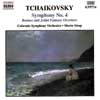Tchaikovsky Symphony No 4
Disappointingly lowkey performances of two of Tchaikovsky’s most dramatic works
View record and artist detailsRecord and Artist Details
Label: Naxos
Magazine Review Date: 9/2002
Media Format: CD or Download
Media Runtime: 0
Catalogue Number: 8 555714

Author:
On my frequent visits to Denver I have followed Marin Alsop’s career with great interest and growing admiration‚ and have watched her build the Colorado Symphony into the fine orchestra that it is today. She has made a great personal success in London and is obviously going to be one of major conductors of our time.
While she has established her reputation in the field of 20thcentury music‚ she has made her mark also with 19thcentury repertoire‚ not least a stunning Denver performance of the Berlioz Requiem. But‚ alas‚ the compellingly passionate advocacy she brought to her splendid Naxos Barber recordings is missing here. On this evidence she is not a natural Tchaikovskian.
The opening of Romeo and Juliet is unbelievably cool‚ the Friar Lawrence theme precise on the woodwind. The absence of anticipatory atmosphere which is so telling in the Karajan/ VPO Decca recording (now coupled with Szell’s Tchaikovsky Fourth on Penguin Music Classics) means that the Allegro simply arrives‚ crisply played‚ but without passion‚ the sword clashes lacking in real vehemence. There is also an obvious lack of tension when the harmony pivots for the arrival of the love theme (a moment of the utmost magic with Karajan)‚ and although it is played tenderly‚ the muted moonlight sequence with sighing horn has little sense of amorous languor. The tension picks up at the development‚ but when the horn recalls Friar Lawrence it is sotto voce; it is only with the entry of the trumpets (12'13") that the music finally springs into vivid life‚ and the reprise of the love theme has a fair degree of ardour. But the following climax does not carry the listener thrillingly and romantically aloft‚ as with Karajan‚ and the drum roll which heralds the coda is untheatrical.
The Symphony opens fairly dramatically (although Szell’s LSO trumpets are more riveting)‚ but the Allegro‚ meticulously played‚ seem almost to proceed on autopilot‚ without the sense of passionate drive that Szell immediately generates. With the Colorado SO the second subject is curiously literal‚ although the wind playing is not without charm. It is only when the strings build the climax‚ with their delicate drooping motif (6'31") over the timpani duplets‚ that one senses the conductor’s involvement. But although the brass climax – with unison horns and the reentry of the Fate theme – is effectively managed‚ one is hardly swept off one’s feet as with the LSO. Then the tension drops again until the huge climax of the development section is carried by the sheer weight of the composer’s scoring. The coda makes its mark with a wellgraduated accelerando‚ but there is no feeling of the conductor’s passionate overall grip on the movement.
The Andante opens simply‚ but the passage which follows‚ with its dotted rhythm (which the composer told us represented ‘active life’)‚ is curiously listless‚ whereas Szell builds it to an overwhelming peak. However‚ Alsop’s reprise of the main woodwinddecorated theme is nicely done.
The Scherzo is the highlight of the Colorado performance‚ the balalaika pizzicati subtly graduated‚ with perceptive use of light and shade‚ and the folksy woodwind and crisp brass of the Trio again demonstrate what a fine orchestra this is.
The culminating movement cannot fail to make an impact; such is Tchaikovsky’s brilliant string writing and sonorous brass scoring that the result is inevitably viscerally exciting when well played as it is here. But there is no feeling of this finale being carried through on a tide of unstoppable emotional power and triumphant splendour that one experiences with the LSO under Szell. The Denver Boettcher Hall is large‚ too large really for an orchestra to make a strong impact on a live concert audience (except in bigscale works)‚ but it has fine recording acoustics‚ and the Naxos engineers make the most of its resonant ambience in what I am amazed to discover were live recordings.
Discover the world's largest classical music catalogue with Presto Music.

Gramophone Digital Club
- Digital Edition
- Digital Archive
- Reviews Database
- Full website access
From £8.75 / month
Subscribe
Gramophone Full Club
- Print Edition
- Digital Edition
- Digital Archive
- Reviews Database
- Full website access
From £11.00 / month
Subscribe
If you are a library, university or other organisation that would be interested in an institutional subscription to Gramophone please click here for further information.




